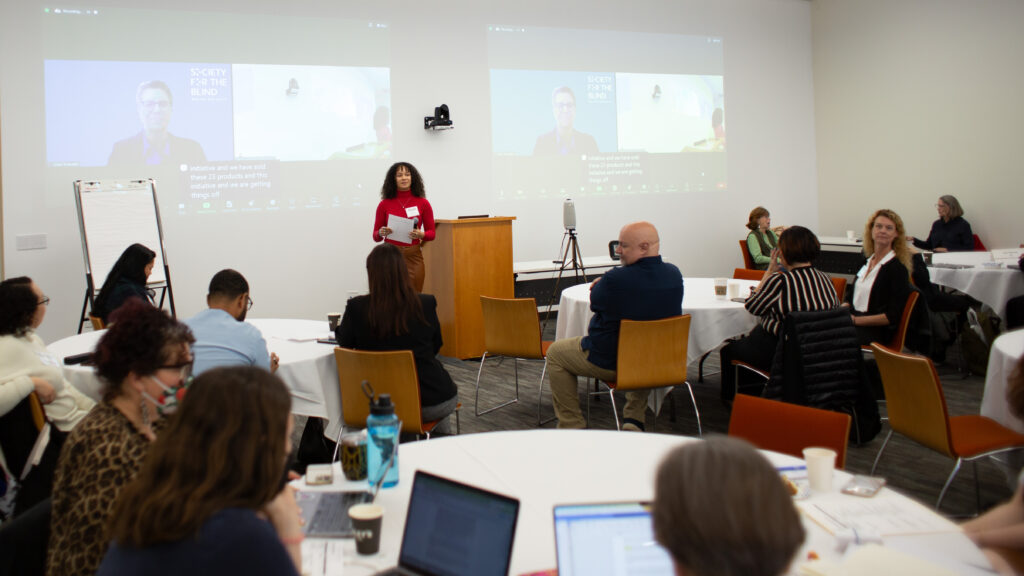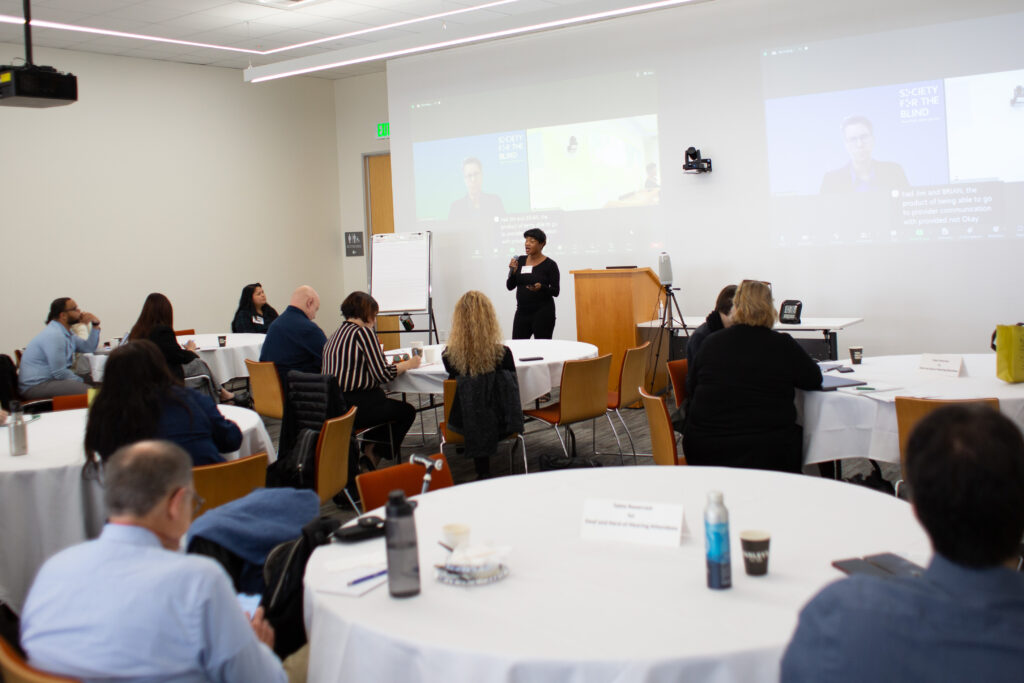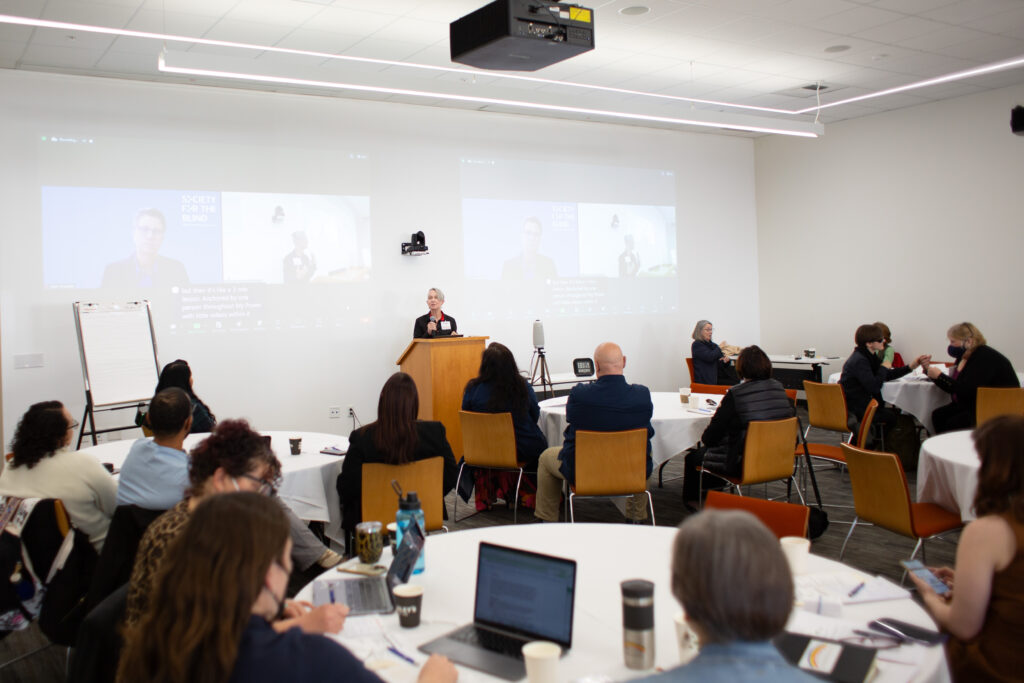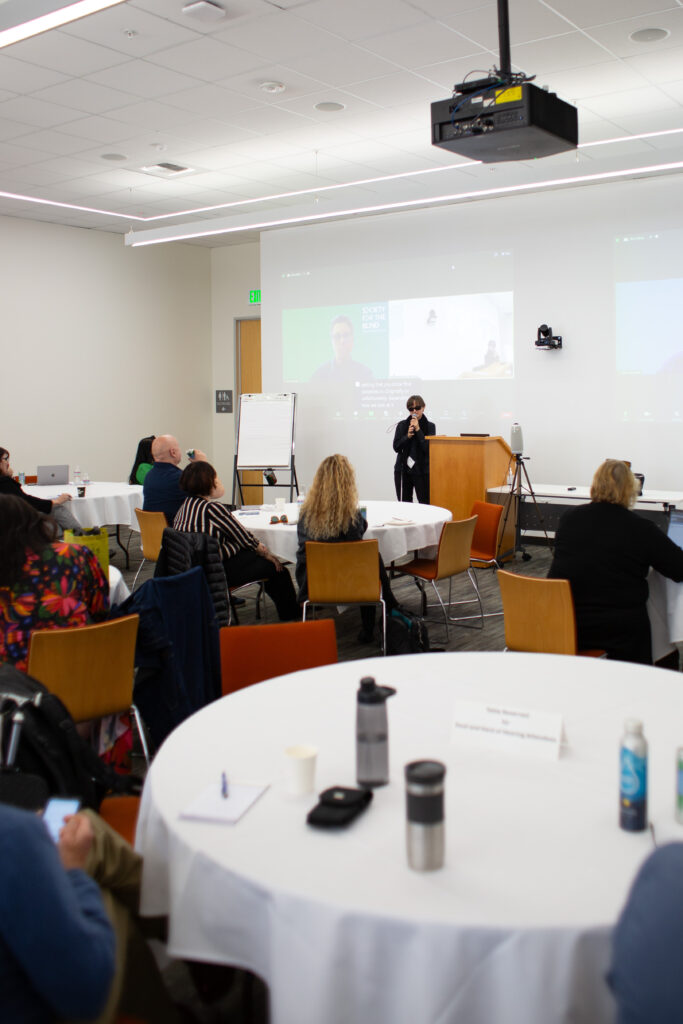Ability Central Grantee Gathering: Success Stories, Community Building, and Plans for the Future

On Tuesday, March 26th, 2024, Ability Central gathered with grantees, staff, board members, and advisory group members to celebrate a year of successes. Ability Central’s 20+ grantees shared their stories from the past year and set their sights on 2024 and beyond.
Matt Cherry, director of philanthropy at Ability Central, ended the day with a message of community and impact.
“I came here as a professional, to listen and learn about how the projects we funded have gone, and I’ve been inspired and excited,” he said. “But I’m also a parent of twin daughters with autism and communication disabilities, and from that perspective, I was, frankly, emotional today. It feels good to hear about so many projects that relate to my personal life, that relate to my family. It resonates.”
“It’s just wonderful to have the privilege of working here and the privilege to hear about all these plans and progress,” he said. “Thank you all.”
2023’s grantee presentations focused on four main categories: Digital Accessibility & Innovation; Training; Career & Leadership Development; and Healthcare. Read on to learn more about our 2023 grantees, share in their successes from the past year, and hear from some of our 2024 grantees about their plans for the year ahead.
Digital Accessibility & Innovation
San Diego Pride kicked off the day’s presentations with a celebration of a year of inclusive, accessible programming for the LGBTQIA+ community. Funding from Ability Central helped San Diego Pride hire a disability coordinator for their team, improve accessibility in their annual Pride march and year-round programming, and host an international Pride accessibility conference with participants from more than 400 Pride organizations around the world.
Next, the Bridge Schoolshared updates about their educational programming for people with cognitive/cerebral vision impairments (CVI).The Bridge School offers augmentative and alternative communication (AAC) device training and other programs for both children and adults, as well as training to help teachers and medical professionals understand CVI and how to work with people with vision disabilities. In 2023, the Bridge School hosted the “AAC by the Bay” conference with attendees from 32 countries, and celebrated three college graduates of their programs—two from the University of California, Berkeley, and one from San Francisco State—all of whom are wheelchair and AAC users.
San Francisco State University provided updates on YouDescribe, an ongoing program using AI-generated video descriptions for YouTube videos. To date, YouDescribe has more than 3,000 volunteers reviewing AI-generated scripts based on a “wish list” of submitted video links. In 2024, SF State plans to focus YouDescribe on healthcare-related videos, as well as videos about visual design and universal design. Multiple SF State graduate students are currently working on or studying YouDescribe as part of their thesis projects.
Training
Kicking off the Training category, California State University East Bay shared more about their aphasia treatment program, which helps 60+ people diagnosed with aphasia focus on “life participation.” People in the program join book clubs, choirs, and other social groups focused on maximizing community engagement. In addition, CSU East Bay’s Project SPEAK offers free, self-paced lessons about aphasia. These resources help medical providers understand aphasia as a diagnosis and learn how to best work with patients with aphasia.
Noah Homes, a housing group for people with intellectual or developmental disabilities (I/DD), took the floor to talk about their memory care programming for adults diagnosed with both I/DD and age-related conditions like dementia. Now celebrating 40 years in action, Noah Homes offers training for medical professionals and social workers about I/DD. Their goal is to move common perception away from sympathy and toward empathy with a “walk a mile in their shoes” approach. Just before the grantee gathering, Noah Homes received a request to run a training program for more than 500 social workers in Los Angeles County.
Next, the Center for Innovation & Resources (CIR) looked back on their leadership training programs for social workers and other professionals in complex fields like child sexual assault, abduction, and forensic interview training. In 2023, CIR expanded their “train the trainer” accessibility program, empowering professionals in California not only to develop accessibility skills themselves, but to teach those skills to others. CIR’s goal was to have 16 participants in their program, but they had 54! Through this program and their other offerings, CIR has seen massive impact beyond California borders.

Community-based project Painted Brain then took the microphone. Founded in 2005, Painted Brain offers community mental health services that incorporate program leadership, development, and feedback from people who self-identify as living with direct or indirect experiences of mental illness. Painted Brain’s Disability Cultural Competency Development Project trains mental health providers on culturally appropriate best practices when working with the disability community. Funding from Ability Central has helped make the program free for participants in California, and Painted Brain plans to expand this program and turn it into an opportunity for paid training.
Society for the Blind shared progress from the Braille Transcription and Production (BTP) Training Project, a campaign that seeks to address the two biggest challenges to bringing braille to classrooms, workplaces, and beyond: a lack of production centers and a shortage of certified braille transcribers. Through the BTP Training Project, Society for the Blind acquired a Sacramento-based braille production center and created a 2-year training program for new braille transcribers. In 2023, their goal was to complete 40 braille transcription projects for clients. In reality, they completed 55!
Through the Self-Advocate Speakers Bureau, Disability Voices United seeks to “change the world by changing the narrative.” They offer training programs focused on self-determination and other aspects of life in the disabled community. By working with other grantees, DVU celebrates the “world-changing dynamism” of their program participants and leaders. Ability Central’s funding allowed DVU to create a training program that developed the public speaking, story-telling, and leadership skills of self-advocates with communication-disabilities. In 2024, DVU plans to launch a website with program participant info available to other organizations for networking, speaker booking, and potential hiring.
Next up was IGNITE. Their 2023 funding from Ability Central helped create a human-centered accessibility project consisting of 12 online “train the trainer” workshops. The workshops focused on creating materials that are accessible to people with disabilities, including people who use AAC. With the central inspiration that “universal design applies to all of us,” IGNITE used their Ability Central grant to improve accessibility in their online classes, retail stores, workbooks, and workshops. In 2024, IGNITE plans to improve these offerings even further based on feedback from current program participants.
Kidpower shared updates on their Safety Powers program, which is available for both children and adults. 2023’s funding helped Kidpower train Safety Powers Leaders and Safety Ambassadors in California to teach personal safety, leadership, and advocacy skills with and for people with communication disabilities in their families, schools, organizations, and workplaces. Kidpower programming focuses on two areas: skills to be safe and thrive with other people, and skills to strengthen relationships and prevent harm. These programs and more can be found in both English and Spanish at SafetyPowers.org. In 2024, Kidpower aims to find more ambassadors with more lived experience. Their programming will focus on the idea that talking about things doesn’t make people any safer; rather, practicing skills does.
The next updates came from Down Syndrome Connection Bay Area’s mental health and aging services for people with Down syndrome and other I/DD. DSC East Bay offers support for people with Down syndrome and their families, from neonatal care to senior memory care and everything in between. Their goal is to prevent crise, rather than prioritizing crisis management. They do this by filling the information gap between medical providers and people with I/DD. In 2023, DSC East Bay served 340+ medical professionals through training programs for Down syndrome and I/DD care. Their program stretches beyond California’s borders, and some of their workshops have featured speakers from as far away as Canada and Alaska.
Career & Leadership Development
Kicking off the Career & Leadership Development session, Society for the Blind joined us again to discuss their Vision Forward Grant from Ability Central. In 2024, Society for the Blind will use this funding to further career goals and improve recruiting and retention for people with vision impairments, celebrating promotions to coordinator, manager, and director levels for people in their programs. The training program features about 70% day-to-day work, 20% additional training from Society for the Blind, and 10% outside education, like attending conferences and other events. In the future, Society for the Blind plans to bring their fully accessible training program model to other organizations.
Mychal’s Learning Place shared updates from their adult day programs with skills training, work experience, and life training for people with I/DD. Their training model avoids labels, “inspiration porn,” and other pitfalls of mainstream I/DD employment programs. Instead, Mychal’s honors independence. Their programming focuses on training first and employment second. Through work in their tee shirt factory and other opportunities, people in the program learn real-world, applicable skills that can help connect them with gainful employment down the line. Mychal’s Learning Place works diligently to close the employment gap for people with I/DD, particularly in response to the COVID-19 pandemic. One example of this is a brand-new restaurant in southern California, fully staffed by people with I/DD. The goal is for the restaurant and its staff members to be fully financially self-sustaining.
The next updates came from QWOCMAP, the Queer Women of Color Media Arts Project. QWOCMAP shared updates from its Film & Freedom Academy, a mentored program for sick and disabled BIPOC filmmakers who identify as LGBTQIA+. Under the Filmmaker Training Program, Academy participants work with a mentor to expand career, job, and educational opportunities in film. The program is fully accessible and offers ADA accommodations. Participants show their final projects during a presentation day at the end of the program. In 2024, QWOCMAP plans to focus even more of their programming on filmmakers of color who are disabled.

Kidpower rejoined us to introduce two new online learning programs called Pridepower and Workpower. Pridepower is a free, self-paced program offering safety skills and discrimination training made by and for people who face greater risks of discrimination because of their sexual orientation, gender identity, or gender expression. Workpower, an upcoming project, will use the same self-paced distance learning model to teach skills necessary for finding and keeping gainful employment. Kidpower has seen huge popularity of video testimonials embedded in lessons, because program participants are able to see themselves in these examples. In the future, Kidpower hopes to expand their (currently volunteer-built) program into paid opportunities for trainers.
Next up, the Center for Independent Living reflected on their paid internship programs for people with communication disabilities. Building off their youth vocational program, CIL’s internships focus on nonprofit and NGO roles for competitive and long-term employment. The six-month programs offer paid internships with peer support, which can continue after the internship ends. CIL also offers disaster preparedness training through a peer ambassador support network and online or physical resources. These resources help disaster preparedness professionals connect with and plan for people with disabilities in times of crisis. Ultimately, CIL’s goal is economic independence for people with disabilities. Through their training programs and mentorship offerings, and with support from Ability Central, they aim to find creative and alternative career fields for people with disabilities.
Healthcare
Kicking off the final session of the day, Autism Society Inland Empire reported on their tailored training program for medical professionals supporting individuals with autism and other developmental disorders. In 2023, ASIE started offering training programs for police officers about autism and other I/DD, including training on sensory kits and AAC-like quadrant boards and communication boards. This program was so popular that firefighters expressed interest, and later, hospital workers also joined the program. In the future, ASIE plans to offer their own grants to create more disability training programs for private security companies, law enforcement, and other fields.
The next presentation came from CERV (Community Emergency Response Volunteers of the Monterey Peninsula). CERV’s Partnership for Inclusive Disaster Services offers online emergency tools and resources for people who use AAC. These resources also help emergency responders understand how to communicate with people who use AAC during emergencies. With Ability Central funding in 2024, CERV also plans to build out their Patient Provider Communication Network, which develops guidelines to make accommodations easy to ask for and automatic for healthcare providers to offer.
Hearts for Sight Foundation joined us to talk about their cultural competency training for providers serving people with vision disabilities, specifically quality mental health services. People with low vision or blindness are susceptible to isolation, depression, and a lack of community support. This has been especially true during the pandemic, when lockdowns forced isolation and a feeling of being cut off from support networks and the rest of the world. Hearts for Sight offers support groups for people with vision disabilities and their families, as well as training services for LCSWs who work with this community. Their team aims to elevate medical professionals with lived experiences of vision impairment. So far, they’ve added 4 providers to their programs who meet these criteria. In 2024, Hearts for Sight plans to use grant money from Ability Central for capacity building, additional services workshops, and more robust peer support services.
Next was the World Institute on Disability, which offers programming by, about, and for people with disabilities divided into three categories: accessibility and universal design, disaster preparedness, and inclusion. WID’s programs provide subject matter expertise for first responders about accessibility and communication with people with disabilities. Because people with disabilities are often part of the “physical human impacts of every disaster,” WID aims to solve emergency responders’ “lack of basic, fundamental knowledge about communication disabilities.” WID offers a virtual healthcare training program for invisible or nonapparent disabilities. Instead of lengthy lessons or workshops, WID offers “piecemeal, small modules” that emergency personnel can work into their busy schedules. They plan on expanding these offerings with Ability Central funding in 2024.

Finally, LightHouse for the Blind wrapped up the day’s presentations with an update on their intersectional training programs for Bay Area healthcare providers. The goal is to strengthen and improve service provision for people who are blind, low vision, or DeafBlind. LightHouse prides itself on an intersectional approach to this training, which also includes training on “extreme basics that shouldn’t need it,” like how to process payments and basic disability etiquette during visits. They also offer resources and training to make telehealth services more accessible for people with vision disabilities, including AAC-inclusive services that take vision disabilities into account. Ultimately, LightHouse focuses on solutions with active recommendations, not just guidelines providers may or may not follow.
To learn more about each of our fantastic grantees, we encourage you to visit their websites, sign up for email newsletters, and get in touch to find more ways to get involved.
For more information about Ability Central’s 2023 grant cycle, see our 2023 Impact Report.
For further questions about our grantmaking program, see the Grants page on our website or reach out to the Ability Central team at grants@abilitycentral.org.
